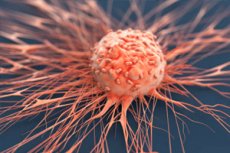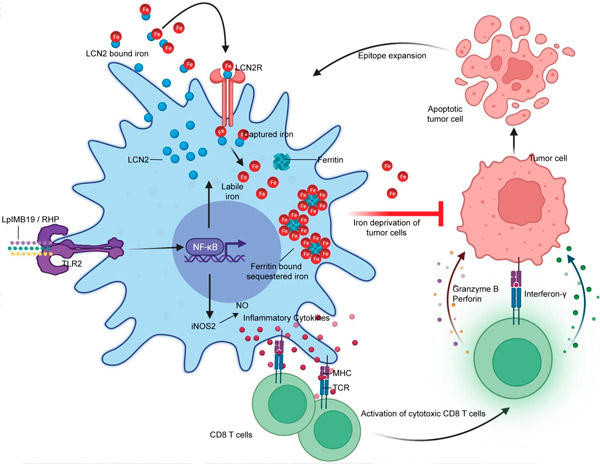Scientists have made progress in microbiome cancer therapy through iron deprivation of the tumor microenvironment
Sist anmeldt: 14.06.2024

Alt iLive-innhold blir gjennomgått med medisin eller faktisk kontrollert for å sikre så mye faktuell nøyaktighet som mulig.
Vi har strenge retningslinjer for innkjøp og kun kobling til anerkjente medieområder, akademiske forskningsinstitusjoner og, når det er mulig, medisinsk peer-evaluerte studier. Merk at tallene i parenteser ([1], [2], etc.) er klikkbare koblinger til disse studiene.
Hvis du føler at noe av innholdet vårt er unøyaktig, utdatert eller ellers tvilsomt, velg det og trykk Ctrl + Enter.

A team from POSTECH and ImmunoBiome has made a potential breakthrough in the fight against cancer. Their study, published in the May issue of of the journal Nature Immunology, examines the bacterial strain IMB001, obtained from dietary sources. This strain induces “nutrient immunity” to enhance antitumor responses. This discovery sheds light on how microbial therapies work and opens the door to their use in clinical practice.
The study, led by Dr. Shin-Heog Im, professor at Pohang University of Science and Technology (POSTECH) and founder and CEO of ImmunoBiome, has developed a new strategy to identify beneficial bacteria suitable for cancer treatment. They also discovered the mechanism by which these bacteria trigger specific immune responses in the body.
They are currently submitting applications for clinical trials of new drugs and plan to begin clinical trials in 2025. IMB001 could be used as a combination therapy alongside existing checkpoint inhibitors.
IMB001 is a unique single-strain live biotherapeutic product (LBP) classified as Lactobacillus plantarum IMB19 (LpIMB19). It has shown impressive results in preclinical studies of various types of cancer. In animal models, IMB001 delayed tumor progression in melanoma, renal cancer, breast cancer and experimental metastases.
In addition, it enhances the effectiveness of checkpoint inhibitor (anti-PDL1) therapy. The research team also isolated an effector molecule, rhamnose-rich capsular polysaccharide (RHP), from the bacteria IMB001. This molecule has shown promising results in animal models. These advances pave the way for a new generation of highly effective and potentially more affordable microbial cancer treatments.
IMB001 therefore also offers a viable option as a combination therapy with conventional cancer treatments. The mechanism of action of IMB001 involves inducing tumor-infiltrating macrophages to an inflammatory phenotype. These activated macrophages further activate the adaptive immune system by increasing the infiltration and activation of IFNγ+CD8+ T cells.
On the other hand, these inflammatory macrophages use a high-affinity iron transporter called lipocalin 2 (LCN2) to deprive tumor cells of iron by capturing and retaining it from the environment. Deprivation of this essential micronutrient iron results in increased death of rapidly dividing tumor cells, potentially leading to epitope expansion (increased number of targets for the immune system) and overall suppression of tumor growth.

Model of anticancer immune response induced by LpIMB19/RHP. Source: Nature Immunology (2024). DOI: 10.1038/s41590-024-01816-x
Professor Im highlighted the significance of this research, saying that it represents a significant step forward for the company and strengthens their position as a leader in the field of LBP. He expressed excitement about the progress of IMB001, discovered by Avatiome, toward clinical development. He also emphasized the importance of understanding how LBPs interact with the immune system to generate potent antitumor responses.
This opens the way to a multifactorial approach to cancer treatment. Professor Im noted that current microbial therapies have often been selected based on their effects rather than the underlying mechanisms. ImmunoBiome successfully identified and confirmed the mechanism of IMB001 to enhance antitumor immunity in tumors.
ImmunoBiome is a leader in developing live biotherapeutic products (LBPs) to combat current incurable diseases such as cancer and autoimmune diseases. Their expertise lies in the discovery, identification and development of live bacteria-based therapies and derivatives.
Using its proprietary Avatiome platform, the company rationally selects pharmacologically active bacterial strains and understands mechanisms of action in various disease settings. They collaborate with the world's leading researchers to identify, isolate, purify and chemically characterize immunologically active molecules from bacteria. ImmunoBiome has created its own database of human commensal bacterial strains isolated from various mucosal surfaces.
In addition, they are at the forefront of developing predictive strategies linking biomarkers to disease prognosis using extensive data sets from human clinical trials.
